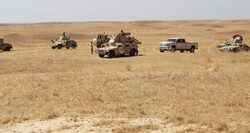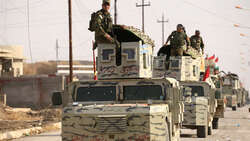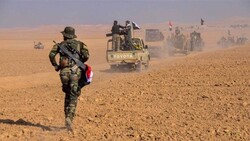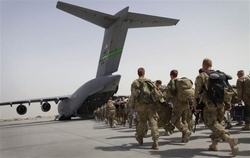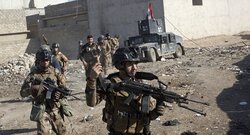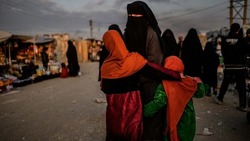EER Webinar: “Beyond Syria and Iraq: The Islamic State’s Growth Around the World”
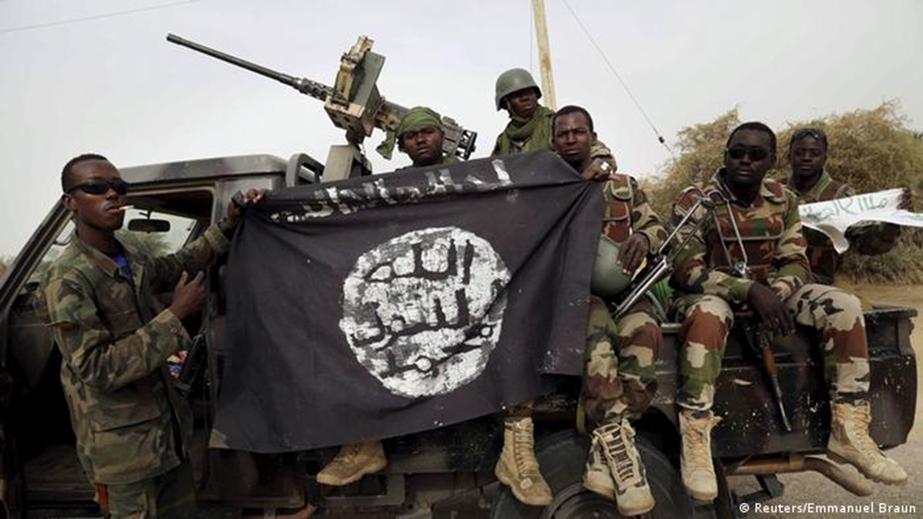
Shafaq News/ It is now four years since the destruction of the Islamic State (ISIS) “caliphate”. ISIS no longer overtly controls cities in Iraq and Syria, the terrorism wave in Europe and America has been reduced, and three “caliphs” have been eliminated. Unfortunately, ISIS continues to show not only signs of life but of growth.
At the Centre, in Iraq and Syria, the pace of ISIS’s insurgent operations has held steady, and there have been some “spectacular” attacks, notably on the main prison in north-eastern Syria containing ISIS’s most dangerous operatives, hundreds of whom were broken free a year ago. The tactics in operation—prison breaks, relentless attacks on security forces, exploiting local political dynamics—are all familiar from the period preceding the “caliphate” declaration. Still, for now, ISIS’s strongholds are in the deserts of eastern Syria, the chaotic Turkish-controlled zone in northern Syria, and the rural belts of central and western Iraq.
Beyond the Centre, ISIS has established a much more robust presence since 2019. In Africa, ISIS’s renegade “Boko Haram” branch in Nigeria has been more or less brought to heel, and the jihadists have control of parts of the north, having fought the Nigerian government to a standstill. In the broader Sahel, despite the pressures of competition with Al-Qaeda, ISIS remains a threat. And in Sub-Saharan Africa—in Somalia, the Congo, and Mozambique—ISIS has established footholds and continues expanding them. Feeding off the chronic problems of governance on the continent, ISIS has advantages going forward.
The other major theatre where ISIS has gained significant strength in Afghanistan, especially since the country was handed back to the Taliban and Al-Qaeda in 2021. The new de facto government has proven powerless against ISIS’s rise and its spread outside Afghanistan into the broader South Asia region. Given that ISIS’s units in Afghanistan have previously been involved in international terrorism plots, this is a serious problem.
To discuss these matters, EER held a webinar with two experts.
Pieter Van Ostaeyen, a Ph.D. candidate at KU Leuven, studied Medieval History with a specialization in the history of the Crusades, and Arabic and Islamic Studies focusing on the history of Salah ad-Din al-Ayyubi and the Nizari Ismailis or “Assassins”. Van Ostaeyen has analyzing the conflict in Syria since its outbreak in 2011 and started reporting on the jihadist foreign fighter flows at the very beginning. He has published multiple papers on different aspects of ISIS, Al-Qaeda, and smaller jihadist factions. Since 2019, his main focus is on the Sahel, monitoring jihadist activity in the region on a daily basis.
Jacob Zenn is an adjunct assistant professor of the graduate-level course, “Violent Non-State Actors in World Politics”, at Georgetown University’s Security Studies Program, and a senior fellow on African and Eurasian Affairs at The Jamestown Foundation in Washington, D.C.
Pieter Van Ostaeyen says the problem of jihadism is spiralling in the Sahel, moving well-beyond Mali. This trend of jihadist expansion has tracked the withdrawal of French troops from Mali and Burkina Faso. The replacement of France’s soldiers by Russia’s “Wagner Group” is “highly alarming”, says Van Ostaeyen, exacerbating the problem by attacking civilians and stealing local resources to fund the Russian war machine in Ukraine.
Between 2021 and 2022, jihadist violence in the Sahel, especially related to Al-Qaeda, doubled, Van Ostaeyen says. Last month, there were fifty-two officially claimed attacks by jihadists—that is ISIS, represented by the Islamic State West Africa Province (ISWAP) and Islamic State in the Greater Sahara (ISGS), and Al-Qaeda, represented primarily by Jamaat Nasr al-Islam wal-Muslimeen (JNIM). There have been that number of attacks in just the first week of April, most of them from ISWAP in Nigeria.
Looking forward, says Van Ostaeyen, “the situation will only get worse in the short term”, not least because Ramadan began recently and will last until the end of April. The trend, as mentioned, has been worsening for a long time, with attacks increasing by 2,000 percent in the last sixteen years and escalating further since 2019. But jihadists use the Holy Month to mobilise their Ramadan campaigns, and such is already in evidence this year.
Jacob Zenn spoke primarily about jihadism in Nigeria, beginning by noting that “Boko Haram” is used as a catch-all term but really refers to three factions. First, there is ISWAP. Second, the renegade branch of ISWAP that was led by Abubakar Shekau until he was killed in 2021; some of this group have been absorbed by ISWAP since then, but a remnant remains, which Zenn refers to as “the (late) Shekau faction”. Third, Ansaru, which is an Al-Qaeda organization that is much smaller than the other two and is in fact at war with them.
ISWAP is, therefore, the main issue and its situation is one Zenn calls “chronic terrorism”: the group is so consolidated in northern Nigeria that it is difficult to see ISWAP being dislodged any time soon. Indeed, as Zenn explains, it is rather worse than that: unlike the massive international anti-ISIS campaign that undid the “caliphate” in Syria and Iraq, the present efforts of the Nigerian government do not even seem intended to push ISWAP from its territorial holdings.
In 2015, the Nigerian elections were won by a candidate promising to “destroy” ISWAP. In the elections several weeks ago, ISWAP was barely an issue. “In other words,” says Zenn, “to win a presidential election in Nigeria now, you don’t need to say, ‘We’re going to defeat Boko Haram’. You don’t even need to say, ‘We’re going to roll back Boko Haram’. It’s almost as if the situation is accepted.”
For ISWAP, this situation means it can administer its version of shari’a governance, collect “taxes” from populations, and train its next generation. The Nigerian government has succeeded at one level—its “super camps” strategy has secured the cities and towns—but the implicit bargain is that ISWAP gets to control the countryside. And this is “fairly acceptable” to both sides, says Zenn. ISWAP is freed from worries about ambushes on its patrols and in general is left to administer its Islamist statelet, while the Nigerian state no longer has to worry about the embarrassment of losing large urban centres.
Zenn says that there has been a “sea change in the last five years or so” in terms of ISWAP’s communications with other ISIS outposts in Africa: these “provinces”—in Nigeria, the broader Sahel, the Congo, Mozambique, and South Africa—used to deal almost exclusively with ISIS in its heartlands in Syria and Iraq, but now the African “provinces” are interacting “horizontally, instead of vertically through ISIS Centre”, says Zenn. What this highlights is one of the benefits to ISWAP—and dangers to everyone else—of holding territory: the group is taking in revenue from taxes, agriculture, and the black market that is then being used to fund ISGS and others.
ISWAP has staged some small-scale attacks of late in southern Nigeria, the first time in ten years there have been attacks in that area, Zenn documents. This means ISWAP has cells in southern Nigeria and therefore retains options to attract global attention by staging attacks on international oil targets or international citizens, Zenn explains.
However, for now ISWAP seems to be holding off on attacks in southern Nigeria because of the de facto arrangement with the Nigerian government described above: action in southern Nigeria, in the mostly Christian area, could trigger political dynamics within Nigeria that forces the state to act against ISWAP, Zenn explains, and attacks on international targets could bring external pressure on the Nigerian state—as well as additional capabilities—to wage war on ISWAP’s statelet. This would be counter-productive for ISWAP, since if present trends remain in place it will be able to further entrench in its territories, to continue absorbing the Shekau faction, and to train up a new generation of jihadists that in the medium-term gives it the strength to have another run at the cities.
Source: European Eye on Radicalization
